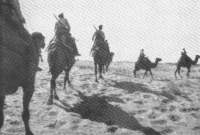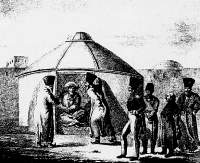Captain Muraviev and the Trials of Diplomacy
 |
Captain Muraviev was young, ambitious, experienced in espionage, (having travelled in Persia disguised as a dervish) and had a good grasp of the Tartar language. There were few others the Russian administration were willing to entrust such a dangerous and delicate mission to. The Captain had been commissioned to travel, disguised, to Khiva where he would attempt to persuade the Khan to sign a declaration of peace and friendship and begin official trade relations with Russia. Nor was this all. The Captain was also to spy out as much information about Khiva as possible, including the fate of the many Russian citizens who had been absconded by Turkoman bandits and never heard from again.
The Captain was dispatched with lavish gifts, with which to sweeten his visit and a helpful reminder from the Governor: "Your capacity for making yourself liked, as well as your acquaintance with the Tartar language, can be turned to good account. Do not regard the art of flattery from a European point of view; they are constantly used by Asiatics, and you need never fear of being too lavish in this respect."
The Captain joined a large Caravan on the Caspian coast, having first
disguised himself as a Turkoman trader. However, events did not go to
plan. Narrowly missing abduction by a different Turkoman Caravan, he arrived
in Khiva only to be made prisoner after reports of his surreptitious note
taking. The Khan eventually decided not to kill this "Urus"
spy, (despite entreaties from his chief Mullah to bury the infidel up
to the neck in the desert and leave him) fearing reprisals.
Muraviev was brought to Khiva and treated warily as a guest. It was time
for all his skills on flattery and diplomacy to be put to the test.
"On the evening of my arrival Hoja Margrum came to make my acquaintance. He is the director of taxation and a very crafty person, but very sprightly in manner. A whole hour passed in mutual compliments, then he begged my permission to solicit the Khan to entrust the whole management of the negotiations to him. I replied that it was not my place to nominate the Khan's officials, but he arranged it for himself the very same evening, and informed me that the Khan had honoured him with the duty, and now requested that I should make over the letters and presents to him.... Yuz Bashi advised me to seal up the packet so as to prevent pilfering on the part of Khwaja Margan and his subordinates....Among the gifts there was a salver on which were packed two loaves of sugar, 10lbs. of lead, 10lbs. of gun powder, and 10 musket flints. The Khan had employed himself all night in gazing at his presents... The Khivans put the following interpretation on this gift:The two loaves of sugar stood, according to them, for an offer of peace and sweet friendship, whilst the ammunition signified that, if friendship were not agreed to, war would be the result."
Having begun his overtures of friendship Muraviev, heeding the words of his superior decided it time for some serious flattery. He had been warned of the common practice of placing Russian slaves to listen and inform behind closed doors, and so decided to make full use of this fact.
"I therefor took a seat close by it, and spoke in a loud voice to the interpreter about the Khan's warlike qualities, his great power, and the superiority of the Khivans to the Persians."
 |
In preparation for his fast approaching audience with the Khan, Muraviev despatched further gifts. Knowing the importance of winning favour through lavish demonstrations of friendships, he also sent gifts to the Khan's influential older brother, Kutluq Murad Inaq, which included a razor set. This was treated with the utmost suspicion by Kutluq, not because of the razors, but because he had never seen soap before. After his personal physician was unable to identify it, he ordered several messengers to the Captain to ascertain its use.
For the Khan himself, Muraviev chose a beautiful, rich red fabric, which he was relieved to see the Khan wearing as a jacket during his eventual audience. He also dispatched a box of nine (ten considered an unlucky number) exquisite brandy glasses. Unfortunately, his best attempts at pleasing the Khan were scuppered by the Khan's newfound piety.
"The Khan had been immensely delighted, and had examined each glass separately, repeating - "What a pity! What a pity that they did not send me these in the days when I drank brandy!" it turned out that he had formerly been much addicted to this beverage, but had now entirely renounced the use of spirituous liquors and tobacco. He had even prohibited smoking among his subjects, and proclaimed that disobedience in this matter would entail the delinquent's mouth being cut up to the ears.... Among the Khan's gifts there was also a glass 'Kaliyan' (hookah stand), which puzzled him very much. The Yuz Bashi did not venture to tell him the truth, so said it was a vessel for holding vinegar, which he had a great fondness for."
For more details about Captain Muraviev's exploits, including the secret message sent to him by the Russian slaves of Khiva, and his eventual return to Russia, see 'The Freeing of the Slaves' chapter of the history section.
Nikolai Muraviev - Journey to Khiva through the Turkoman Country 1819-20.
| Tour Links: | |
| 'The Khan's Court' (Kunya Ark) | |
| 'Tosh Hauli Palace' | |
| Historical
Travellers Overview | The Wandering Moor | The Luckless Wool Merchant The Diplomatic Spy | The Hungarian Dervish | The Lone Female The Eccentric Cyclist | The True Blue Captain |